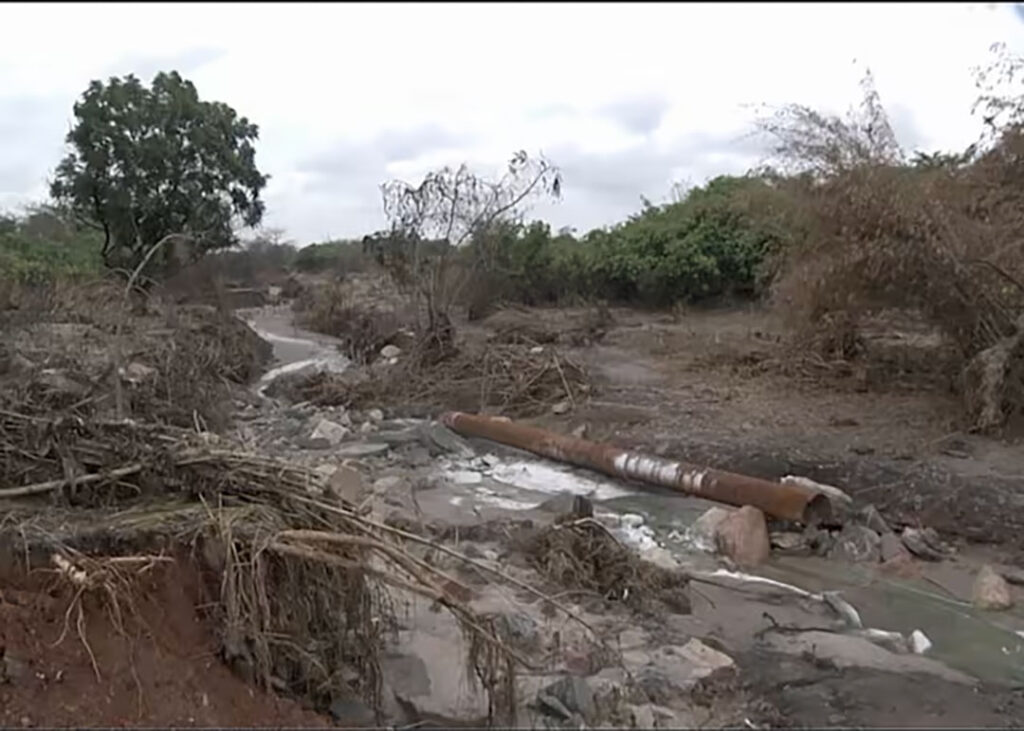Less than two weeks after 50 million liters of toxic mining waste burst from the Sino-Metals Leach copper mine into the Kafue River, three Zambian government ministers conducted a surprise visit to another Chinese-owned mine 11 kilometers away where authorities previously had suspended operations due to environmental noncompliance.
On March 1, at the Rongxing Mineral Processing Plant, they found acid leaking from the same kind of tailings dam that collapsed at Sino-Metals on February 18, causing the country’s worst environmental disaster in years.
A livid Collins Nzovu, minister of Water Development and Sanitation, spoke to reporters after seeing the leaky tailings dam, which is where the toxic effluent from mining operations are stored in a series of large lakes and ponds surrounded by earth-fill embankments.
“During our inspection, we discovered that Rongxing Mineral Processing Plant in Kalulushi had been polluting our river system with impunity,” he said, according to Zambian newspaper the Daily Nation. “We have shut down operations, ordered an immediate cleanup and demanded compensation for affected communities.
“I am appalled by the blatant disregard for environmental regulations, and this needs to stop so that people’s lives and the environment are protected.”
The ministers had Rongxing’s director arrested and ordered police officers to deploy around the site to enforce the shutdown, which had been ordered in early February after a mine operator was killed when he fell into a drainage system filled with acid. The gruesome accident could have been avoided, a co-worker said, if the company provided adequate personal protective equipment.
The spill at Sino-Metals, and its catastrophic impact on the Kafue River and surrounding communities, have brought attention to Chinese-owned mining companies in Zambia, their environmental and labor abuses, and routine negligence.
From government officials to environmental and civil society groups, there are widespread concerns that the huge Sino-Metals spill will contaminate the groundwater. Nzovu’s Ministry of Water Development and Sanitation said the “devastating consequences” also included the destruction of crops along the river’s banks.
“I used to sell at Chisokone market, but I closed [the] shop because there was no business,” Margaret Musongole, a farmer from the Mwambashi area, told The Africa Report in March. “Now, these Chinese have come to destroy my maize fields. It feels like being killed twice.”
Sino-Metals’ response to the spill only came after civil society groups and local media picked up the story. The company reportedly paid for several metric tons of lime to be dumped into the affected waterways, but experts say lime will counter the impacts of extreme acidity levels only and do nothing about other toxins and heavy metals still present in the water.
“There is serious concern about remediation efforts,” Luwi Nguluka, director of communications for the Wildlife Crime Prevention organization in Zambia, told ADF. “Even if acidity levels normalize, heavy metals will persist in the river system, poisoning fish and other aquatic life for years to come. Some species may adapt to acidic conditions, but this shift would be disastrous for biodiversity and the people who depend on fishing.”
Nguluka said the biggest issue now is a lack of transparency and accountability in the cleanup process.
“Without proper monitoring, it is difficult to ensure that remediation efforts are effective and that public statements match the reality on the ground,” she said. “Reports indicate that affected communities are not receiving adequate water or food supplies, raising further doubts about the mine’s commitment to meaningful intervention.”
According to a 2024 Afrobarometer survey, China’s favorability in Zambia has declined by 30% since 2014. Anti-Chinese sentiments have been growing due to Chinese lending practices and Zambia’s debt default.
Today, China owns more than $4 billion of Zambia’s foreign debt and has promised $5 billion in copper investment there by 2031. However, a number of prominent civil society advocates like Maggie Mwape are concerned that China has locked Zambia in a debt trap, which could affect efforts to remediate these toxic spills and protect the environment.
“China’s significant economic and political influence in Zambia could potentially undermine efforts to hold Sino-Metal accountable for the pollution spill,” she told ADF. “The Zambian government may face pressure to prioritize economic interests over environmental and social concerns.
“It is essential for civil society, local communities and international organizations to maintain pressure on the government and Sino-Metal to ensure that those responsible are held accountable and that measures are taken to prevent similar disasters in the future.”
Emmanuel Matambo, a research director at the University of Johannesburg’s Centre for Africa-China Studies, said the latest spills will dredge up the longtime debate over environmental damage that historically has come with Chinese mining in Africa.
“While this concern had died down around the 2010s, the Kafue spillage will revive it and will shine a very unflattering light on Chinese investment in Zambia,” he told the South China Morning Post newspaper. “[It] will set back Zambia-China relations in a very damaging way.”
Iva Pesa, an assistant professor in contemporary history at the University of Groningen in the Netherlands, called the Sino-Metals spill one of “Zambia’s largest mine disasters in history.” She worries that it is indicative of a system of cost-cutting among mining companies.
“I do believe it is a sign of systemic ‘cutting corners’ in terms of Chinese mining investment in Zambia,” she told the Post. “I believe Chinese companies want to cut costs as much as possible — a kind of ‘race to the bottom’ — and environmental precautions are not always respected.”

